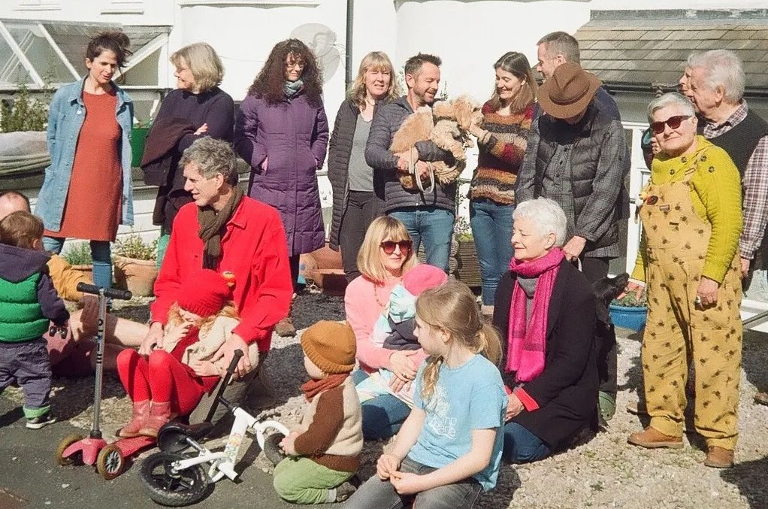If the last few years have revealed anything, it is that shocks and uncertainty happen – and how well we endure and recover has a great deal to do with our resilience.
All too often resilience is seen as an individual quality, a personal toughness. Have a savings account for a rainy day, take time for self-care to build a strong mind and body, take out an insurance policy in case of the worst.
But what if… we instead saw resilience as something we share in common? Resilient communities are at the heart of Transition. People are coming together to ask how can our communities have reliable and healthy local food supplies; secure, affordable, clean energy; safe places to live and connect with nature? How can we adapt locally to the changing climate even as we try to reduce our impact? And how can we build stronger connections, local democracy and a better future for everyone?
Phil Frodsham of Transition New Mills, described how clear this need for community resilience became when their town was threatened by a bursting dam in 2019: “We had army, police, the roads were closed, we were cut off. During the week, it was actually really nice because we turned this adversity into something positive. What you want is to do that when there’s not a dam about to burst – that’s the trick, do it before the emergency strikes.”
In the lockdown, again people naturally came together to help each other and to find opportunity in crisis. More recently, as winter heating bills soared, Transition New Mills helped to bring the town together to build a network of ‘welcoming spaces’ in 10 venues including churches, community and youth centres and more. “As any Transition group, we work hard to build connections over the years,” said Phil. “About half the groups were new to us, like the leisure centre, which was really nice. It feels positive we are all coming together – we’re saying let’s meet up again whether or not this needs to continue. Because it doesn’t half make the burden lighter for us all.”
As they used their convening skills to bring sectors together, Phil said Transition New Mills brought some imagination and Transition values to the process. Instead of framing the warm rooms as ‘them and us’ charity for those in need, they shaped them as an opportunity to connect, build community, learn and share skills: “We asked, what are we inviting people to come in to? Is it about sitting on their own for six hours or something a bit more meaningful? Wouldn’t it be lovely if we got to spring and people said I enjoyed that time, I made that connection or I learnt a new skill.”
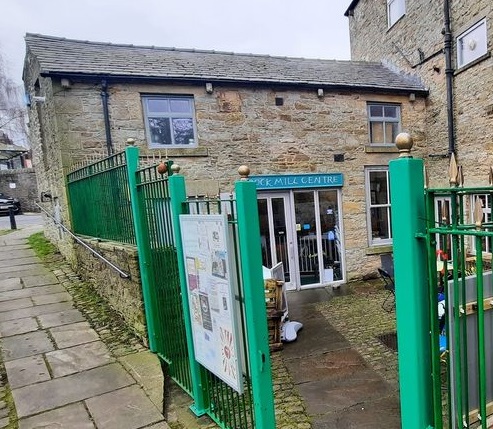
Rock Mill Centre, run by Transition New Mills
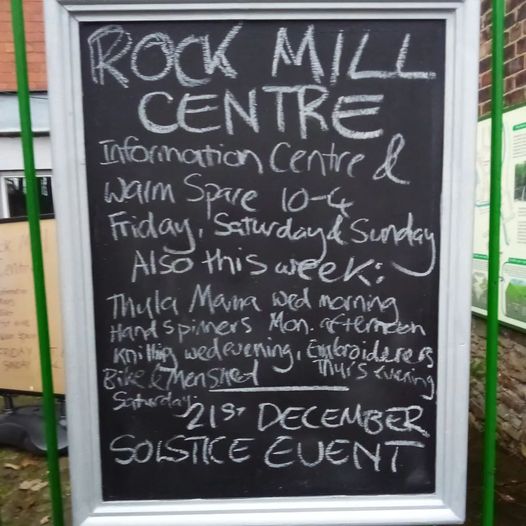
An invitation outside to drop in to the welcoming space, open three days a week
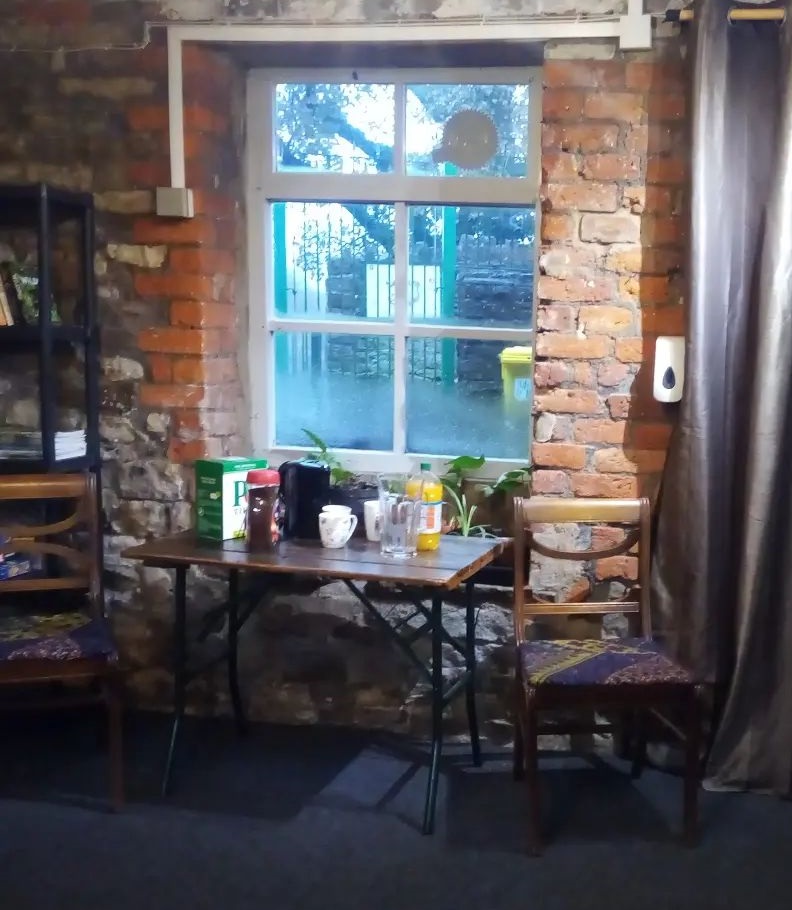
Transition New Mills created this cosy corner for anyone to use in the colder months
Transition New Mills took over the town’s Rock Mill visitor and heritage centre last year, and equipped it with a sofa, books and board games for their welcoming space, opened three days a week by volunteers. They also see it as a space where people can explore a better future for the town. There’s exhibition and events space, vegan cafe, wormery, the work of local artists for sale, bike repairs, and the courtyard was recently home to a harvest and threshing day for locally grown wheat.
Space to Connect
We need spaces to connect and for things to emerge if we are to grow relationships and collective resilience – public places with no fee to participate, like libraries and community centres. Creating a reason to come together can be vital to get people in the room.
We previously explored how food can bring people together while addressing the impact of crises like rising food prices and lack of local food production on individuals. How pay-as-you-feel cafes, pop up community meals, food co-ops and community fridges distributing surplus food play a key role in getting affordable meals to people. And, because they are open to all they can feed crucial connections among local people.
A community space with many different activities gives people a way to plug into local networks. The growing network of community climate hubs create spaces to engage and explore environmental issues, inviting people to think about what can be done locally to respond. Zero Guildford, for example, meets a range of local needs with their baby clothes library, energy advice and a community fridge, while making space for open mic nights, quizzes, second-hand clothes sales, film screenings, for craft and wellbeing workshops. Sustainable Tiverton collected the keys to their eco-hub this month – it will be a base for people to connect with existing projects and for new ideas to take off.
Sharing
Debbie Bourne founder of Transition Kentish Town partner project, Think & Do said: “On our door knocking of various estates, many residents have said they can’t get involved in climate action as they can’t afford to. Sharing is another story. We’ve all got something we can share: food, a skill, a story, a celebration …. or stuff.”
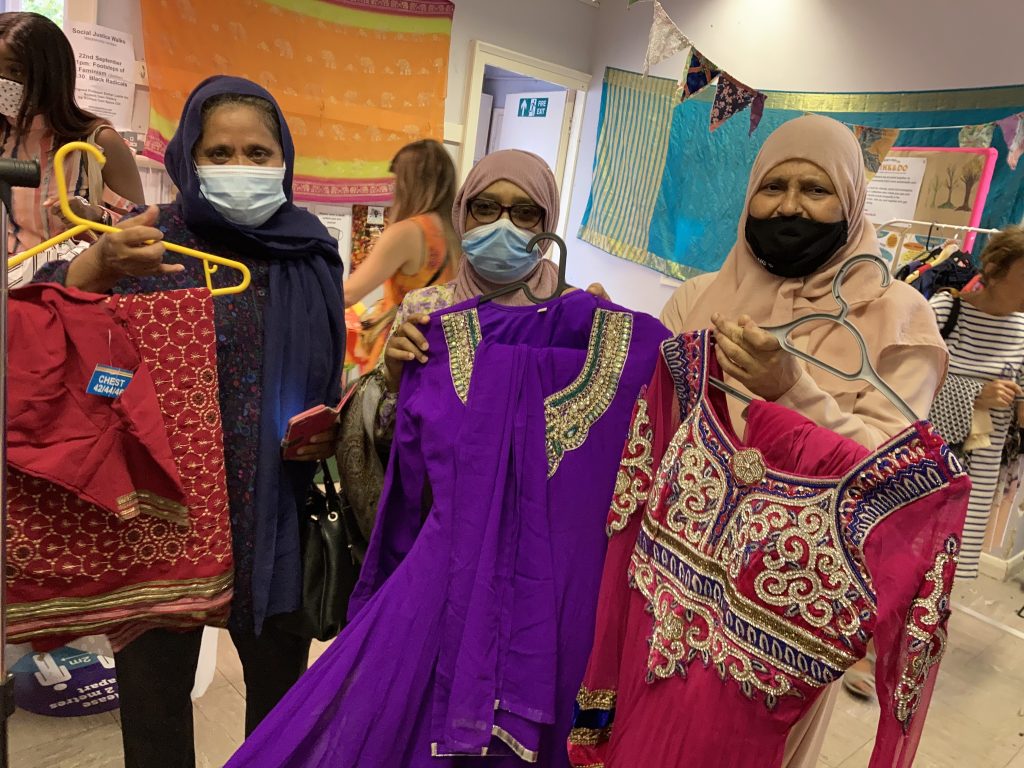
Three women with the clothes they’ve swap at a Think & Do event. Picture: Think and Do
The group has reopened Tenants and Residents Association halls on London estates – community spaces that were built into the design of social housing, but which, after years of under-funding and neglect, have mostly been under lock and key. They’ve held clothes and toy swaps, shared food and run workshops where people can share their skills, always with space for new ideas and collaborations to emerge.
These pop-up informal events on the face of it seem simple and social, but under the surface have more profound benefits. A community that is already practised at sharing, at expressing and meeting each other’s needs, has a better chance of thriving through thick and thin, because they have already created the habits and ways of pooling resources.
So these small scale initiatives can help communities build their sharing muscles. They open the door both to larger-scale ways to share resources and open minds to different ways of thinking about resources, ownership and resilience itself – as something we have when we pull together instead of something to be jealously guarded by individuals or households.
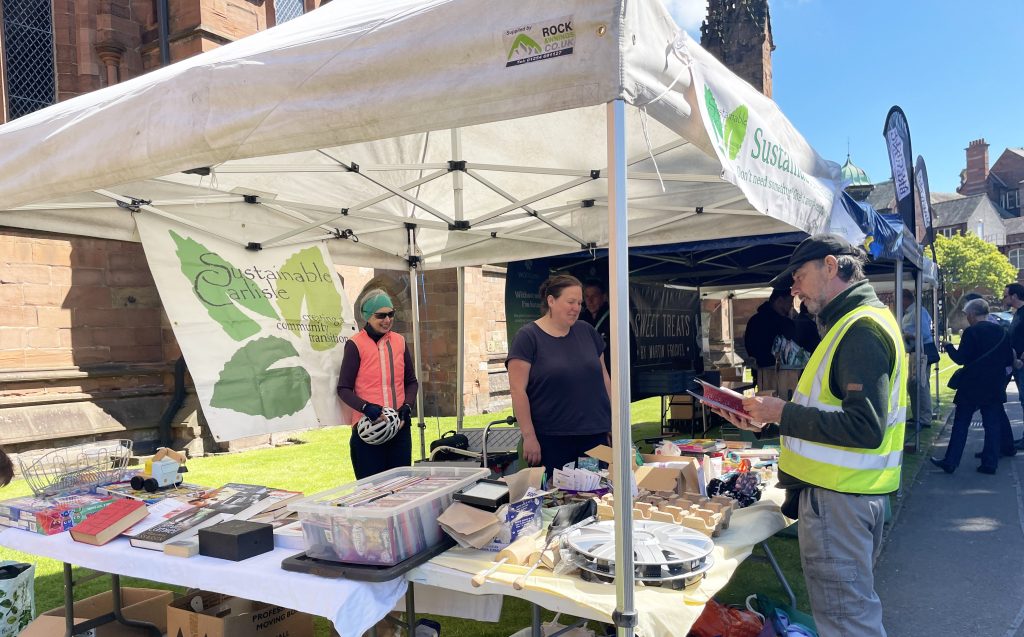
Sustainable Carlisle’s monthly free stall gives a channel for people to share and get what they need, and opens great conversations about Transition.
Many groups facilitate sharing in their communities informally or through events like seed and plant swaps. Sustainable Carlisle runs a free stall at the monthly farmers market. Katie from the group said people were astounded that so many good quality items were being freely given away, and it leads to many conversations with new people about Transition and the future of their community. Sustainable Tiverton runs a ‘Give and Take’ pop up shop periodically, while the Marston Eco-hub’s Giving Garage is open each Saturday lending and swapping gardening and household items and food from the community larder.
Libraries of Things offer another channel for sharing. Crystal Palace Transition Town was instrumental in developing a Library of Things model now rolled out by a number of London boroughs. Transition Exmouth set up Exmouth Library of Things in 2021. Bianca from the project said it has helped individuals and community groups in Exmouth to do, make and build more, try new activities and learn new skills because they could get hold of the equipment needed without having to buy it at personal expense – something that’s not always affordable.
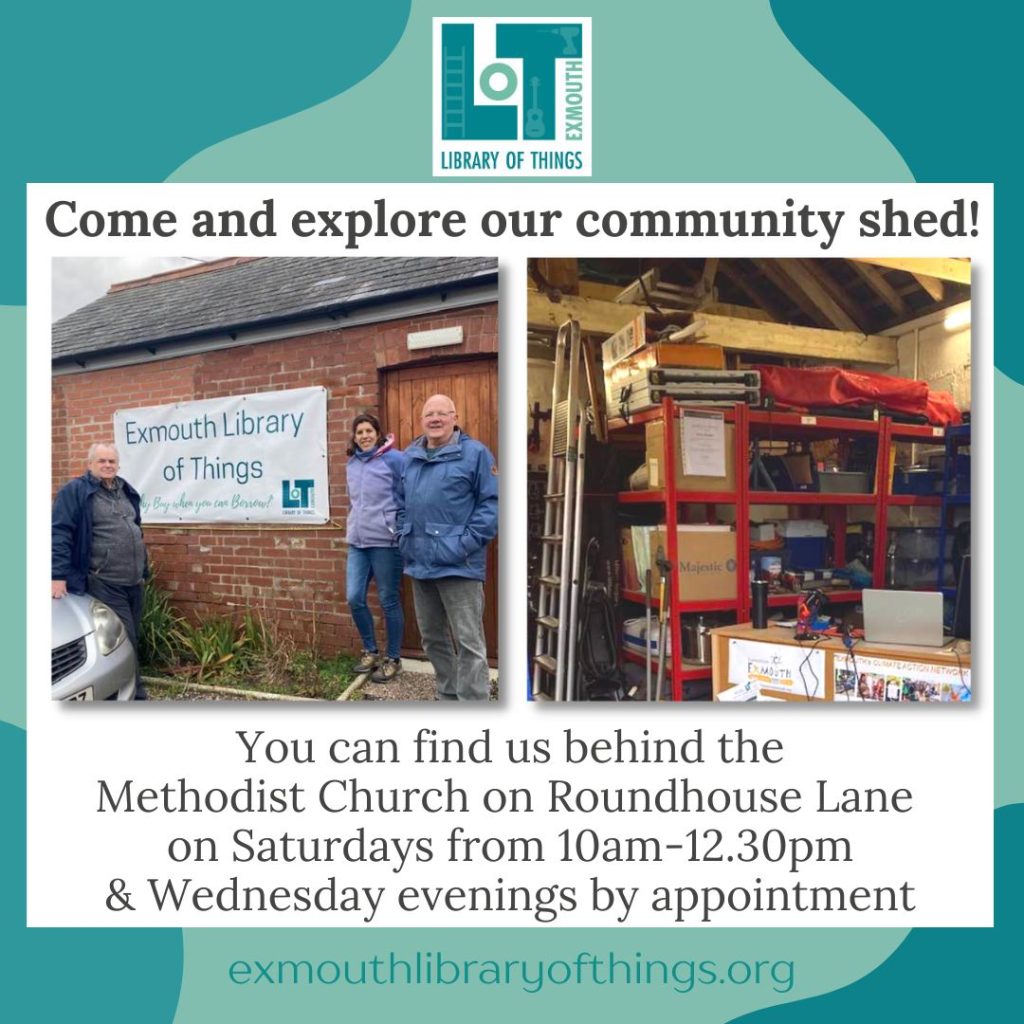
Transition Exmouth set up Exmouth Library of Things in 2021 to help local people share resources.
Transition group Cloughmills Community Action Team shows how it can work in their small rural Northern Irish community. Inspired by forerunners such as Share Oxford, Share Frome, Plymouth’s Borrow Don’t Buy, Hull Library of Stuff and the mobile Share Shed, several Transition groups are working right now on setting up Libraries of Things, including Buxton, Tiverton and Cheltenham.
Tool Libraries like those in Edinburgh, Belfast, Liverpool and Transition Stirling’s go beyond simply lending tools by giving access to skills and workspace, offering classes and informal mentoring, so people can make, repair and do more for themselves. Founder of Edinburgh Tool Library, Chris Hellawell highlights the shift in thinking that such libraries invite: “We don’t need a drill, we need a hole in the wall.”
Sharing can extend beyond stuff of course. Think of transport – it doesn’t need to be about owning a personal vehicle, if there are affordable, regular, reliable ways to travel. Transition Llandrindod is working to set up a local electric car club, in a part of Mid Wales with minimal public transport. Transition New Mills and Transition Exmouth are making cargo bikes available to the community. Transition Town Wellington runs a local lift sharing facebook group while Sustainable Keswick is setting up a pilot with Karshare, where car owners can rent their own cars out to neighbours and tourists.
<
Repair cafes like those run by Transition Dover, Chesterfield, Dorchester and many more offer a way to share time and skills with the community. There are now over 250 UK repair cafes and the Community Repair Network offers a guide to setting one up.
Increasingly sharing and repairing is popping up in high street social enterprises, creating jobs and making our town centres more resilient too. Check out Fixing Factories, Remakery, which Transition Brixton helped to instigate, Edinburgh Remakery, Remake Newport and Bath-based Share and Repair.
Resilient neighbourhoods
Even really local space to connect can be transformative, as the Transition Streets project has found. Developed by Transition Town Totnes in 2009 and replicated internationally, it brings together six to eight households at street level to explore issues around food, energy, travel, water, resources use and their vision for their street. The first participants saved £570 in bills and over a ton of carbon per household, as working together made it easier to take action. But more than that, the invitation to meet weekly in each other’s homes, share food and questions changed people’s relationships for the long term.
“Even just that very first meeting can be quite fabulous” said co-ordinator Ruth Leonard-Williams. “Just these little connections starting to fire, people are really warmed by that.” The project was relaunched last year and is sharing its approach with other communities.
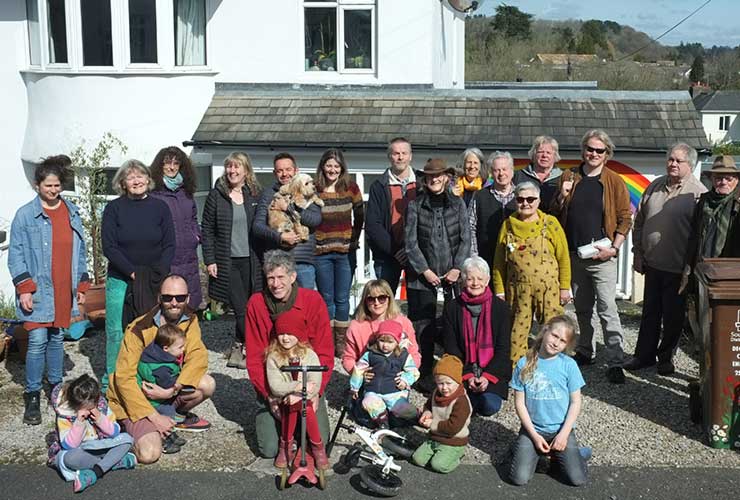
Residents of Sparrow Road took part in the Transition Streets programme, now residents team up to make bulk food orders together and love to have street parties and street play days to keep the connections going. Photo: Transition Streets
She said: “For me, it is just so positive and empowering because for so long the environmental mainstream has fed messages around the individual, ‘change your lightbulbs’ and so on. But bringing people together at a really small-scale level, taking action at the same time, being together with your immediate neighbours is really important.”
Participating streets have kept working together, sharing lifts or cars, running a community cinema or play streets, rallying round neighbours when life is tough. One street has developed a share garage, with toys and equipment available to all the neighbours. “That’s really bringing sharing down to the people around us,” Ruth adds. “I love libraries of things, but I feel like we should be able to call on the person next door.”
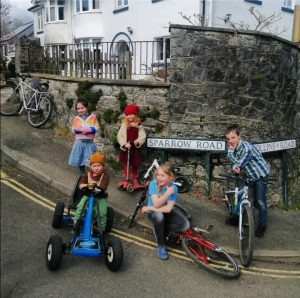 Kids in Sparrow Road, Totnes, enjoy the regular car free play street sessions set up after the Transition Streets project. Photo: Transition Streets.
Kids in Sparrow Road, Totnes, enjoy the regular car free play street sessions set up after the Transition Streets project. Photo: Transition Streets.
Ruth believes the most profound impact of Transition Streets is the sense of connection. One street rallied round to care for one resident so she could be discharged from hospital. In another, a ramp was built so two housebound neighbours could meet up every day. “People who were previously quite isolated have people they can call on, that has such a huge impact on how they look at the world and feel part of a web of connection. That’s the thing about a spider’s web – the tighter the web, and the more connections, the less likely it’s going to break.”
“We try to instil the understanding that everyone is equal in the space and has something useful to contribute. No one holds the answer, it’s a collective thing. Together we can do amazing things if we support people with the right conditions.”
Read more about how Transition and other inspiring community groups are growing collective resilience in energy and food.


